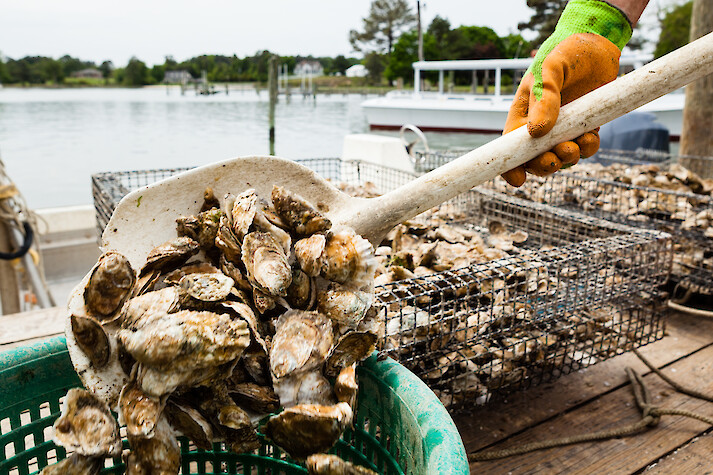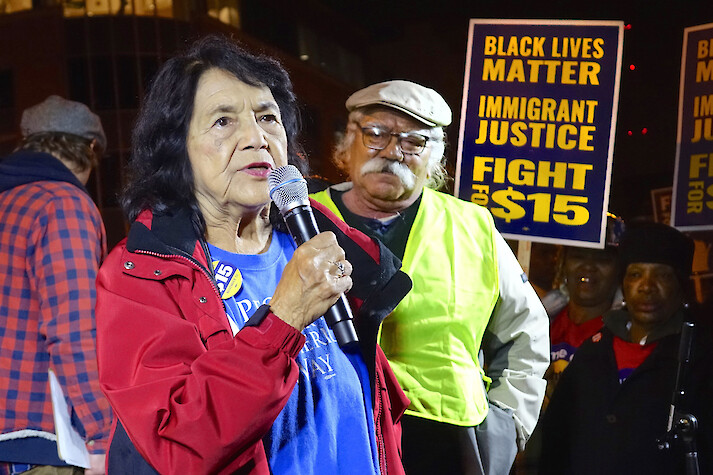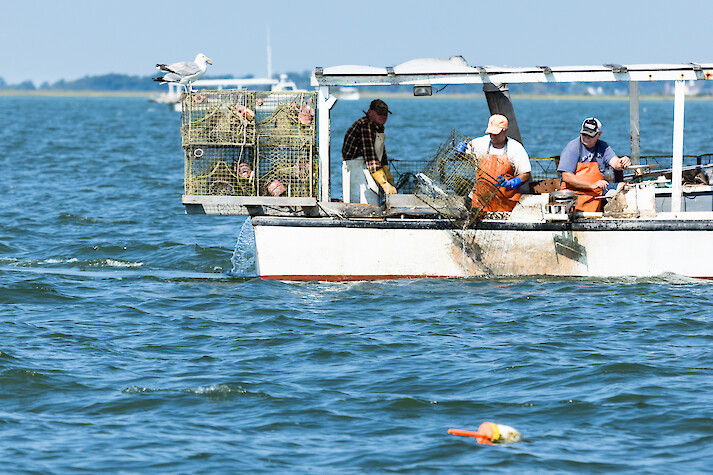Labor Unions and Environmental Justice
Olivia Wolford ·This week, we took an important step in the creation of our environmental justice index: identifying stakeholders across the Chesapeake Bay community. A broad range of groups were named by our classmates, from the Brandywine TB Southern Region Neighborhood Coalition to the Maryland Commission on Indian Affairs. Workers/labor unions were among the broad groups listed, and I would like to briefly expand more on their historic and present relationship to the environmental movement, as well as which groups are active in the Chesapeake Bay.

Unions in the United States
The struggle for workers' rights across industry and agriculture has a long history in the United States. Immigrants, women, Black people, Indigenous people, and other people of color have always been central to the fight to collectively bargain for safe working conditions and equitable wages. Though labor unions have existed in the U.S. since the 18th Century, the 1960’s and 70’s represent a time when the political interests of workers and environmentalists intersected sharply. Unions contributed to crucial pressure on the government that led to the creation of the Clean Air Act (1963) and Clean Water Act (1972), having long recognized the negative health impacts of the pollution in their workplaces.
Many unions across the country have organized to support climate justice. However, unions are not monolithic, and have varying cultures and collective goals. Some environmental regulations have been opposed by unions who fear a reduction in jobs or pay in their field. This fear underscores the urgent necessity of an economic transition to renewable energy and expanded worker ownership of our economy.

When discussing organized labor in the Chesapeake Bay, it’s important to remember that labor unions do not encompass the full scope of worker exploitation. In the United States, 25% of private sector employers fire workers who attempt to organize a union. Undocumented workers, seasonal/temporary workers, and other workers with increased economic/social vulnerabilities are at a higher risk for punitive retaliation and job loss. Anthropological research with immigrant farmworkers on the Eastern Shore reveals a pattern of substandard worker housing, exposure to pesticides, and constant proximity to physical and psychological stressors. Despite reports to the proper health authorities, their experiences are routinely ignored in the face of institutional power. Incorporating the experiences of workers who are not able to participate in collective bargaining and advocacy remains an important environmental justice consideration for our class.
Organized Labor in the Chesapeake Bay
A variety of unions/labor organizations across many industries are active in Maryland. For the purpose of our class, I’ve looked into several that focus specifically on those working with natural resources on the Chesapeake Bay:
- Maryland Watermen's Association Inc.
- Charles County Watermen's Association
- Anne Arundel County Watermen's Association
- Seafarers International Union
- East Coast Shellfish Growers Association

This is far from an exhaustive list, and I look forward to learning more about the organized labor presence in the Chesapeake Bay with my classmates. Workers’ rights encompass the intersection of racial, immigration, economic, and environmental justice, and I am glad we are considering them in the creation of our environmental justice index.
Next Post > Facilitating a Great Barrier Reef partnership workshop in Brisbane
Comments
-
Peter 4 years ago
The following only represents my personal opinion. Although unions are good in general, things have two sides. The union did improve the treatment of workers in the early stage, but after the rise of salary, although most of the people are satisfied, the union sometimes may not be satisfied. In the end, if the capitalists temporarily compromised, they might also withdraw their capital and set up factories elsewhere. Workers were dumbfounded. The upper manager of the union went to other factories and continue this set. A typical case for this is the General Motors, and I heard that most of their factories has been removed to other countries. For environment, I also agree we need to protect our environment, but the main job of a industry is to make pollution, it just need to be more efficient but also care about capitalist's wallet
-
Isabel Sullivan 4 years ago
Awesome job encompassing the variety of stakeholders we are wanting to reach on the Chesapeake Bay! I think you bring up a good point with unions and an even better point that workers are often exploited because of attempting to unionize or due to their background. The often seen power dynamic keeps workers in difficult positions where they can either keep a job that exposes them to hazards or be unemployed. Additionally, as you point out, this often affects immigrant workers who have even fewer job opportunities than documented citizens.
-
Amber 4 years ago
It is clear that substandard wages, housing and working conditions, etc. effect those who have less political power and the union is a great way to provide resources for these communities. Are the unions seeking them out to help them? How can they unionize without losing their jobs?
-
Taylor Gedeon 4 years ago
I really appreciate the research you did to highlight the variety of unions/labor organizations across industries in the LES. You also made a great point about the diversity of opinions and values held by different unions and the need for work ownership. Great blog!
-
Katrina Kelly 4 years ago
Great work, Olivia. The discussion around a worker-driven economy aligns well with one of the core tenets of our founding documents (i.e., "a government for the people by the people...") and would represent a step in the right direction towards greater balance and equity. The influence of multinational corporatocracies adds to the fears and pressures of de-unionized workers. I have even worked some hourly jobs where hourly employees were discouraged from talking to union organizers if they came to the workplace and invited us to join.
-
Amanda 4 years ago
Very interesting. In a previous class, we had an ongoing discussion about the benefits and drawbacks to unions. Having an equity lens on such a discussion would be really valuable for building a more supported and inclusive workforce.
-
Chelsea Richardson 4 years ago
Historically it has been shown that environmentalists and unions are on two different sides of a fight (climate vs. economic). I think it is crucial that environmentalists and unions realize that they are allies. The same corporate groups that are resisting renewable and green energy are often the same ones that are trying to dismantle labor movements. Hopefully for our class environmental stakeholders and union members can realize that alliance and that together they can fight climate change AND fight inequality.
-
Faith Taylor 4 years ago
I love this blog post! I think you touched a really important point that we didn't fully develop in class and that is the role of labor unions. This blog is well written and well researched, GREAT job =)
-
Megan 4 years ago
Great blog. Helps show how watermen have such a powerful voice in Maryland - because they are unionized!
-
Andrea M Miralles-Barboza 4 years ago
Olivia brining up topics we had not touched on but that are SO important! It really shows you that issues of EJ are pervasive in all ways, and that our institutions are responsible for upholding systems that perpetuate inequities. Thanks for dissecting this important topic!
-
Shakira 4 years ago
Olivia,this is a well put together post. I appreciate the extra research done to take the discussion from class to the next level. I also like that you mentioned the reports made to authority & nothing was done, because many assume people have not taken the steps to handle situations properly, when they really have been over looked.
Also, I liked the structure of the blog. Great work! -
Jehnae Linkins 4 years ago
I think the topic of unions/labor organizations always brings up two different sides. I like the point you made about the diversity of opinions and values held by different unions/labor organizations.
-
Sarah 4 years ago
Your list of unions in the Chesapeake Bay region was especially insightful for me. I am aware that watermen are often stakeholders in the management of a species in the Chesapeake Bay, for the most part, but I did not know that there were unions for the watermen, especially within counties.
Great blog post! Short, but packed full of information and facts! :) -
Ashley Silver 4 years ago
I was trying to find the article to share, it discussed conditions are getting worse for employees since the pandemic. They are overworked and have fear of being exposed to the virus due to precautions by the companies not being met.
-
Imani Wilburn 4 years ago
I have definitely never considered this side of environmental justice. I have thought of the economic impacts of some regulations put forth, but never going as far as to consider jobs lost and unions. Not only did your blog enlighten me about this possible consequence of environmental justice but you also made me really understand the other side of things. I also really loved the list of unions in the area involved in the natural resources of the Chesapeake Bay.
-
Nylah McClain 4 years ago
While delving further into our specific indicators, Bill let me know that improvements to the sewer system can be frowned upon because of the longevity of current sewer management practices and the jobs they secure. I think the fear of having to regain power within a new system when you’re already in a group that had to fight so hard to get power in an old system makes unions wary.

